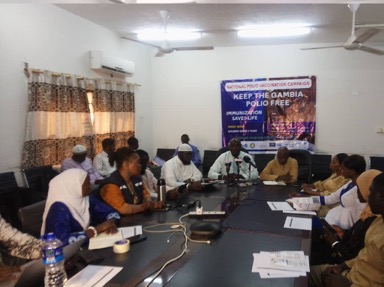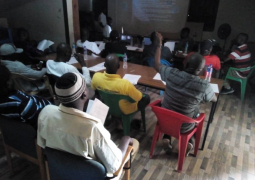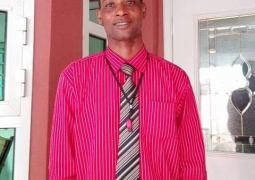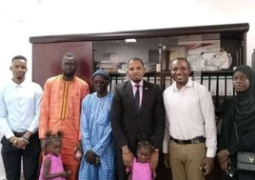
It would be recalled that The Gambia had the last polio outbreak in 1986, even though the health coverage was very high. This, among others, prompted the authorities to came with a recommendation that henceforth, any child born in the country should be given the vaccines immediately.
Further, the vaccination will target all children aged 0 to 59-months old across the country. During the exercise vaccination teams and social mobilisers will be moving from house-to-house, schools, markets, ferry crossing points, garages, health centres, border entry points and in strategic locations.
Besides, this campaign, will be conducted while simultaneously administering Vitamin A supplement to children.
Welcoming the gathering, Sidat Fofana, Program Manager for the Expanded Program on Immunization, explained that the move is part of global response to eradicate polio from the face of the earth.
He added that what makes this exercise very important but also difficult as a mammoth exercise that the World Health Assembly is set to achieve.
He described [polio as a very dangerous and debilitating disease that cripples, thus making them a liability to society.
“There are a lot of disease that are raving the human population. But this one exceptional. So, any firm of polio virus is a problem and we don’t want to see it.”
Fofana recalled that in 1986, The Gambia had the last polio outbreak, even though the health coverage was above 70%.
This discovery he added, has surprised many scientists across the globe, adding that the Centre for Disease Control came to assist the country and eventually did their investigation.
However, he noted that experts were unable to ascertain what the actual cause the polio outbreak was, saying it was then recommended that any child born in the country should be immediately given the polio vaccine.
After that wild polio outbreak 1986, Fofana noted that they are now battling with another one that is not within the human population, but exists within ‘our environment.’
“So, we need to take care of it and if we fail to do so, it may find its way into the human population as seen in some of our neighboring countries, where children are seriously affected by it. No country can survive well when you have a population of crippled people. So that is why we need to take care of this.”
EPI Programme manager also spoke about the mode of transmission of polio virus and the need for people to embrace good hygienic methods to save people and the community.
Fofana also spoke about the country’s high routine immunisation coverage and challenged parents, caregivers and guardians to participate fully during the course of the exercise to save the country from this debilitating disease.
For her part, Aziza Amina Sehid, Risk Communication World Health Organization, on behalf of the Country rep, while thanking officials at the Ministry and all partners, acknowledged that polio continues to pose threats to The Gambia, and called on media practitioners to amplifyy key messages on the disease to help eradicate it from the face of the earth.
The campaign, she said, is meant to prevent children from the threats of polio, which she added, continues to wreak havoc in communities.
She thus called on all parents, caregivers to take part in the initiative in their collective efforts to make the country polio free.
Jacob Serge Akono, on behalf of the UNICEF country representative, expressed his agency’s resolve to support the country during the exercise, as part of global polio eradicating initiative.
He spoke about the devastating impact of the disease and that UNICEF is working for children globally.
The presser also witnessed power point presentation on EPI and polio vaccination campaign.





